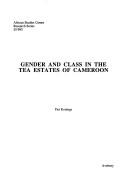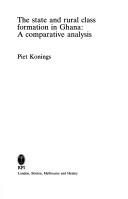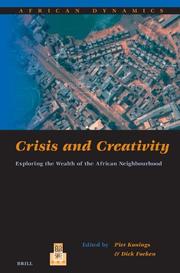| Listing 1 - 10 of 15 | << page >> |
Sort by
|

ISBN: 1859723551 9781859723555 Year: 1995 Volume: 5/1995 Publisher: Leiden: African studies centre,
Abstract | Keywords | Export | Availability | Bookmark
 Loading...
Loading...Choose an application
- Reference Manager
- EndNote
- RefWorks (Direct export to RefWorks)
Tea plantation workers --- Labor unions --- Women --- Plantations de thé, Travailleurs des --- Syndicats --- Femmes --- Economic conditions --- Conditions économiques --- Economic conditions. --- Plantations de thé, Travailleurs des --- Conditions économiques --- Women - Cameroon - Economic conditions. --- Tea plantation workers - Cameroon. --- Tea plantation workers - Labor unions - Cameroon.
Book
ISBN: 1283593300 9786613905758 995672825X 9956728128 995672730X 9789956728251 9789956728121 9789956727308 9789956727308 9781283593304 6613905755 Year: 2012 Publisher: Mankon Langaa Research and Publishing CIG
Abstract | Keywords | Export | Availability | Bookmark
 Loading...
Loading...Choose an application
- Reference Manager
- EndNote
- RefWorks (Direct export to RefWorks)
This book explores the relationship between plantation labour and gender in Africa. Such a study is the more opportune because most of the existing works on plantation labour in Africa seem to have either under-studied or even ignored the changing conceptions of gender on the continent in recent times. One of the book's major concerns is to demonstrate that the introduction of plantation labour during colonial rule in Africa has had significant consequences for gender roles and relations within and beyond the capitalist labour process. The book focuses on two tea estates in Anglophone Cameroon
Agricultural laborers --- Women in agriculture. --- Farm women --- Agricultural workers --- Farm labor --- Farm laborers --- Farm workers --- Farmhands --- Farmworkers --- Male employees --- Women employees --- Agricultural industries --- Industrial relations --- Plantation workers --- Social conditions. --- Capital and labor --- Employee-employer relations --- Employer-employee relations --- Labor and capital --- Labor-management relations --- Labor relations --- Employees --- Management --- Agribusiness --- Industries --- Female employees --- Women workers --- Working women --- Workingwomen --- Male workers --- Men employees --- Men workers --- Agriculture --- Social conditions --- E-books --- Sociology of the family. Sociology of sexuality --- Sociology of work --- Cameroon
Book
ISBN: 1283198231 9956716251 9786613198235 9956716375 9956615455 9789956716371 9789956558230 9956558230 Year: 2009 Publisher: Leiden : Bamenda, Cameroon : African Studies Centre ; Langaa,
Abstract | Keywords | Export | Availability | Bookmark
 Loading...
Loading...Choose an application
- Reference Manager
- EndNote
- RefWorks (Direct export to RefWorks)
Civil society and empowerment have become buzz words in neoliberal development discourse. Yet many unanswered questions remain on the actual nature and configuration assumed by civil society in specific contexts. Typically, while neoliberals perceive civil-society organisations as vital intermediary channels for the successful implementation of desired economic and political reforms, they are inclined to blame the current resurgence of the politics of belonging for the poor record of these reforms in Africa and elsewhere. This book rejects such notions and argues that the relationship between
Neoliberalism --- Civil society --- Neo-liberalism --- Liberalism --- Social contract --- Cameroon --- Politics and government

ISBN: 0710301170 9780710301178 Year: 1986 Publisher: LONDON: KPI,
Abstract | Keywords | Export | Availability | Bookmark
 Loading...
Loading...Choose an application
- Reference Manager
- EndNote
- RefWorks (Direct export to RefWorks)
Social classes --- Cocoa trade --- Rice trade --- Ghana
Book
ISBN: 9780852552186 Year: 1993 Publisher: London Currey
Abstract | Keywords | Export | Availability | Bookmark
 Loading...
Loading...Choose an application
- Reference Manager
- EndNote
- RefWorks (Direct export to RefWorks)
Digital
Year: 1981 Publisher: Leiden African Studies Centre
Abstract | Keywords | Export | Availability | Bookmark
 Loading...
Loading...Choose an application
- Reference Manager
- EndNote
- RefWorks (Direct export to RefWorks)
Social stratification --- Political systems --- Agricultural techniques --- Ghana
Book
ISBN: 1283004895 9786613004895 9956579262 9956579246 995657810X 9789956579266 9789956578108 9789956578030 9956578037 Year: 2011 Publisher: Bamenda Leiden, the Netherlands Langaa RPCIG African Studies Centre
Abstract | Keywords | Export | Availability | Bookmark
 Loading...
Loading...Choose an application
- Reference Manager
- EndNote
- RefWorks (Direct export to RefWorks)
This book discusses the social and political consequences of the economic and financial crisis that befell African economies since the 1980's, using as case study the plantation economy of the Anglophone region of Cameroon. The focus is thus on recent efforts to liberalize and privatize an agro-industrial enterprise where overseas capital and its domestic partners have converged, the consequent modes of production and labour, and the alternatives proposed and resistance generated. The study details how the unprecedented crisis caused great commotion in the region, and presented a serious challenge
Agriculture --- Economic aspects --- Cameroon --- Politics and government. --- Economic conditions
Book
ISBN: 1283227363 9956717681 9786613227362 995671710X 9956717312 Year: 2011 Publisher: Bamenda, Cameroon : Langaa Research & Pub. Common Initiative Group,
Abstract | Keywords | Export | Availability | Bookmark
 Loading...
Loading...Choose an application
- Reference Manager
- EndNote
- RefWorks (Direct export to RefWorks)
Neoliberalism has become the dominant development agenda in Africa. Faced with a deep economic and political crisis, African governments have been compelled by powerful external agencies, in particular the Bretton Woods institutions and western states, to pursue this agenda as a necessary precondition for the receipt of development aid. What is particularly striking in Africa, however, is that neoliberal experiments there have displayed such remarkable diversity. This may be due not only to substantial differences in historical, economic and political trajectories on the African continent but

ISBN: 9004150048 9789004150041 9047409035 1435614828 9781435614826 9789047409038 Year: 2006 Publisher: Leiden Brill
Abstract | Keywords | Export | Availability | Bookmark
 Loading...
Loading...Choose an application
- Reference Manager
- EndNote
- RefWorks (Direct export to RefWorks)
At times of economic and political crisis in Sub-Saharan Africa, urban dwellers display a large degree of creativity in their survival strategies by developing social networks and constructing imaginative and original practices and ideas. This volume views the urban neighbourhood from two different perspectives and explores the importance of these creative processes. The first approach considers the neighbourhood as a geographical domain in which people are engaged in a variety of activities to advance their material and immaterial well-being, making use of their 'wealth' of opportunities, assets and diverse forms of natural, physical, financial, human and social 'capital'. The second angle sees the neighbourhood as not necessarily geographically located or bounded but as having been created and defined by human beings. These neighbourhoods may take on the form of self-help organizations, associations or churches, or may be based on gender, generational, ethnic or occupational identities. As the contributions from all over Sub-Saharan Africa show, the two approaches do not necessarily exclude each other.
Sociology of environment --- Community organization --- Economic geography --- Sub-Saharan Africa --- City and town life --- Neighborhoods --- #SBIB:39A4 --- #SBIB:39A73 --- Neighborhood --- Neighbourhoods --- Communities --- City life --- Town life --- Urban life --- Sociology, Urban --- Toegepaste antropologie --- Etnografie: Afrika
Book
ISBN: 281112280X Year: 1993 Publisher: Paris (22-24, Bd Arago 75013) : Éditions Karthala,
Abstract | Keywords | Export | Availability | Bookmark
 Loading...
Loading...Choose an application
- Reference Manager
- EndNote
- RefWorks (Direct export to RefWorks)
Mais la découverte de ces formes d'accumulation a conduit maints experts -en particulier de la Banque mondiale- à surestimer l'opposition entre l'État et la société, et à imputer à la seule corruption des classes politiques ou au dirigisme étatique la crise économique. À partir du cas du Cameroun, cet ouvrage montre que les choses sont plus complexes et ambiguës. Les processus "informels" d'accumulation, bien bien loin de représenter un "autre sentier" qui mènerait au développement, sont en réalité étroitement imbriqués aux circuits de l'État. L'une des originalités de cet ouvrage est de souligner combien les variations régionales contribuent à compliquer les itinéraires d'accumulation et les procédures de chevauchement entre les positions publiques et positions privées d'enrichissement. Aucun pays d'Afrique, peut-être, ne se prête mieux à cette analyse que le Cameroun. Quelques-uns de ses meilleurs spécialistes se sont réunis pour préciser les multiples chemins qu'y emprunte l'argent et pour élargir le débat à l'échelle du continent. Peter Geschiere est président de l'Afrika-Studiecentrum de Leiden. Piet Konings est chercheur au même centre.
Cameroon --- Economic conditions. --- Economic policy. --- SOCIAL SCIENCE / Anthropology / General
| Listing 1 - 10 of 15 | << page >> |
Sort by
|

 Search
Search Feedback
Feedback About UniCat
About UniCat  Help
Help News
News